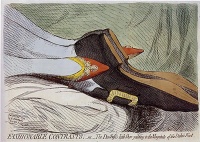Masochism
From The Art and Popular Culture Encyclopedia
|
"The masochist desires to experience pain, but he generally desires that it should be inflicted in love; the sadist desires to inflict pain, but in some cases, if not in most, he desires that it should be felt as love." --Studies in the Psychology of Sex, Volume 3 , Havelock Ellis "To fall at the feet of an imperious mistress, obey her mandates, or implore pardon, were for me the most exquisite enjoyments, and the more my blood was inflamed by the efforts of a lively imagination the more I acquired the appearance of a whining lover." --Confessions (1782) by Jean-Jacques Rousseau "By masochism I understand a peculiar perversion of the psychical vita sexualis in which the individual affected, in sexual feeling and thought, is controlled by the idea of being completely and unconditionally subject to the will of a person of the opposite sex; of being treated by this person as by a master, humiliated and abused. This idea is coloured by lustful feeling; the masochist lives in fancies, in which he creates situations of this kind and often attempts to realise them. By this perversion his sexual instinct is often made more or less insensible to the normal charms of the opposite sex incapable of a normal vita sextialis psychically impotent. But this psychical abnormal, gives a masterly portrayal of complete feminine sadism in his " Penthesilea.""--Psychopathia Sexualis (1886) by Richard Freiherr von Krafft-Ebing "Krafft-Ebing gives as representing the experiences of a masochist (_Psychopathia Sexualis_ English translation, p. 201): "The relation is not of such a nature that what causes physical pain is simply perceived as physical pleasure, for the person in a state of masochistic ecstasy feels no pain, either because by reason of his emotional state (like that of the soldier in battle) the physical effect on his cutaneous nerves is not apperceived, or because (as with religious martyrs and enthusiasts) in the preoccupation of consciousness with sexual emotion the idea of maltreatment remains merely a symbol, without its quality of pain. To a certain extent there is overcompensation of physical pain in psychic pleasure, and only the excess remains in consciousness as psychic lust. This also undergoes an increase, since, either through reflex spinal influence or through a peculiar coloring in the sensorium of sensory impressions, a kind of hallucination of bodily pleasure takes place, with a vague localization of the objectively projected sensation. In the self-torture of religious enthusiasts (fakirs, howling dervishes, religious flagellants) there is an analogous state, only with a difference in the quality of pleasurable feeling. Here the conception of martyrdom is also apperceived without its pain, for consciousness is filled with the pleasurably colored idea of serving God, atoning for sins, deserving Heaven, etc., through martyrdom.""--Studies in the Psychology of Sex, Volume 3 |

Illustration: Fashionable Contrasts (1792) by James Gillray.
|
Related e |
|
Featured: |
Masochism, the sexual pleasure or gratification of having pain or suffering inflicted upon the self, often consisting of sexual fantasies or urges for being beaten, humiliated, bound, tortured, or otherwise made to suffer, either as an enhancement to or a substitute for sexual pleasure. The name is derived from the name of the 19th century author Leopold von Sacher-Masoch, known for his novel Venus in Furs that dealt with highly masochistic themes. A lot has been written on masochism, from Freud to Reik, but one of the best descriptions is by Havelock Ellis (inset left).
Contents |
Etymology
According to the Online Etymology Dictionary, "from the German Masochismus, coined 1883 by German neurologist Richard von Krafft-Ebing (1840-1902), from name of Leopold von Sacher-Masoch (1836-1895), Austrian utopian socialist novelist who enshrined his submissive sexuality in Venus in Furs (1869, German title "Venus im Pelz")."[1]
See also
Theory
- Psychopathia Sexualis
- In The Romantic Agony, Mario Praz describes the shift from female masochism towards male masochism that occurred in mid-19th century.
- Masochism: Coldness and Cruelty by Gilles Deleuze
- Sadism and masochism as medical terms
- In Masochism in Modern Man (1941), Reik argues that man is inherently masochistic
- Helene Deutsch (1884 – 1982), an Austrian-American psychoanalyst and colleague of Sigmund Freud postulated the now antiquated view that all women are masochistic by nature (Deutsch 1930), reinforcing Krafft-Ebing's and Freud's views.
- In the Realm of Pleasure: Von Sternberg, Dietrich, and the Masochistic Aesthetic by Gaylyn Studlar
Masochism in culture
- Sadism and masochism in fiction
- Phantom of Desire, a 2003 exhibition in Graz curated by Peter Weibel.
- Belle de jour
- Je... Ils...
- Laure: the Collected Writings
- Colette Peignot on her masochistic relationship with Georges Bataille
- The Bitter Tears of Petra von Kant
- The sadistic Petra and her masochistic assistant Karin in this film by Fassbinder
- Of Human Bondage
- In William Somerset Maugham's novel, Of Human Bondage- The main character Philip Carey becomes enticed by a woman named Mildred, who does not care an ounce for Philip. He becomes masochistic, willing to put himself in the line of pain to gain Mildred's affection. In the end, he realizes that this is a one-sided love and that he is controlled by his own passions.
- Tightrope
Namesakes
- Les Masochistes (1960) by Roland Topor

